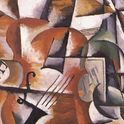Such wattage! David Bowie’s star hasn’t dimmed since his death in January 2016. Barely a month passes without the release of a handsome box set or a pricey picture disc. There are photobooks, exhibitions, postage stamps. Monographs herald him as a one-man art school, a pop visionary, a queer icon, a Samaritan for misfits. Paul Morley, author of The Age of Bowie, claims he was “a human Google through which you can search where pop has bounced and rebounded since the 1960s.”
This September also sees the release of Brett Morgen’s Moonage Daydream. While it isn’t the only film about Bowie, it is the first to be officially sanctioned by his estate. Intended less as a documentary than an “experiential cinematic odyssey” and, more loftily still, “a roadmap of how to survive the 21st century,” it begins with a quote from Nietzsche, draws liberally on the aesthetics of Stanley Kubrick’s 2001: A Space Odyssey and, helped by Bowie’s long-time collaborator Tony Visconti, makes terrific use of the singer’s back catalogue.
Moonage Daydream, which gets its name from a song on the 1972 album Ziggy Stardust, is creation myth as much as biography. Bowie is presented as half-man, half-meteorite—a kind of space creature. There are trippy sequences featuring stars, planetary systems, fireworks. The most riveting scenes zoom in on Bowie’s fans—male and female, hair dyed, faces painted with erratic lightning bolts—watching their hero on stage. Some scream, others are stunned into silence. All are embarked on rapturous study. Bowie is their sorcerer, their shaman.
Morgen’s film will be shown at London’s BFI Southbank alongside films Bowie acted in, like The Hunger and Merry Christmas, Mr Lawrence. It’s the BFI’s second Bowie screening series this year and represents a big change from the 1980s and 1990s, when the music weeklies routinely sniggered at Bowie the actor. They saw him as part of a lineage of pop stars (Elvis, Sting, Madonna) with ambitions loftier than their talents. Many rock journalists placed a premium on musicians performing from their souls; how could Bowie, whether as John Merrick in The Elephant Man or the Goblin King in Jim Henson’s Labyrinth, or introducing The Snowman, seem anything other than absurd?
Yet Bowie was as much an actor as he was a pop singer. His mother had worked as a cinema usherette. His father, a would-be impresario, had introduced him at an early age to all-round entertainers such as Tommy Steele. His first TV appearance in 1964, on the current affairs programme Tonight, was essentially a performance—he pretended to be the leader of a non-existent organisation called the Society for the Prevention of Cruelty to Long-Haired Men on whose behalf, with a straight face, he exclaimed: “We don’t see why other people should persecute us.” In 1966, already interested in mime, he met dancer and choreographer Lindsay Kemp. The pair had a brief affair and a longer creative relationship, collaborating on the play Pierrot in Turquoise and exploring many of the ideas that went into Ziggy Stardust.
Kemp would later claim that he taught Bowie about the importance of stagecraft, of how to make an entrance, how to use movement and stillness to dramatic effect. The singer, who spoke of himself as a collector of personalities, was into the art of personae—not just Ziggy Stardust, but Aladdin Sane and the Thin White Duke. He described his take on black American music—without irony or self-flagellation—as “plastic soul.” Indeed, whether borne of restlessness or philosophy, Bowie’s belief that identity itself is a performance—something always evolving and mutable—is key to his popularity with young people today.
There are those who would argue Bowie’s most memorable performances were on stage or in videos for his songs; others believe he never managed to recapture the strung-out otherness he displayed in the film The Man Who Fell to Earth. Yet it’s remarkable how often he was cast by major directors—David Lynch, Martin Scorsese, Christopher Nolan. Even in the mid-1990s, an artistically fallow period, he was diverting as Andy Warhol in Julian Schnabel’s biopic Basquiat. His talent for comedy was evident in his cameos in Ben Stiller’s Zoolander and, in 2006, in Ricky Gervais’s Extras.
My favourite screen memory of Bowie is from 1982, when he took the lead role in Alan Clarke’s TV version of the Bertolt Brecht play Baal. He plays an amoral troubadour who impregnates a teenage girl, abandons a mistress and murders a friend. The film, shown during primetime on the BBC, is cold, alienated and utterly indifferent to whatever a mainstream drama is supposed to feel like. Bowie’s eagerness to appear in it is a tribute to the questing vision that characterised his whole career.












